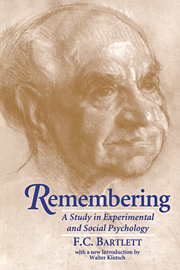Book contents
- Frontmatter
- Contents
- Biography of Sir Frederic C. Bartlett
- Introduction by Walter Kintsch
- Preface
- PART I EXPERIMENTAL STUDIES
- PART II REMEMBERING AS A STUDY IN SOCIAL PSYCHOLOGY
- Chapter XIII Social Psychology
- Chapter XIV Social Psychology and the Matter of Recall
- Chapter XV Social Psychology and the Manner of Recall
- Chapter XVI Conventionalisation
- Chapter XVII The Notion of a Collective Unconscious
- Chapter XVIII The Basis of Social Recall
- Chapter XIX A Summary and Some Conclusions
- Index
- Plate section
Chapter XVIII - The Basis of Social Recall
Published online by Cambridge University Press: 04 August 2010
- Frontmatter
- Contents
- Biography of Sir Frederic C. Bartlett
- Introduction by Walter Kintsch
- Preface
- PART I EXPERIMENTAL STUDIES
- PART II REMEMBERING AS A STUDY IN SOCIAL PSYCHOLOGY
- Chapter XIII Social Psychology
- Chapter XIV Social Psychology and the Matter of Recall
- Chapter XV Social Psychology and the Manner of Recall
- Chapter XVI Conventionalisation
- Chapter XVII The Notion of a Collective Unconscious
- Chapter XVIII The Basis of Social Recall
- Chapter XIX A Summary and Some Conclusions
- Index
- Plate section
Summary
REQUIREMENTS OF A THEORY OF SOCIAL RECALL
The pathway to an understanding of the general mechanism of remembering is strewn with rejected theories; but concerning social memory proper there has been much less speculation. For the most part the arguments used have turned upon analogy. A more or less elaborate likeness has been drawn between the social group and the human individual, and on the basis of this, whatever is attributed to the latter has been ascribed to the former. This is certainly unsatisfactory. What is required is a direct study of social facts, and conclusions should be founded upon these facts alone. Speculations based upon analogy are bound to appear incomplete and unconvincing.
There are, it is true, a number of views regarding the social origin of memory. Prof. Pierre Janet has, for example, written upon this topic in his most persuasive and attractive manner. Human beings, he believes, confronted by a difficult world, have been forced to invent various special ways of dealing with adverse circumstances. The most important of these all concern the utilisation of absent objects. Many of the most significant biological advances, such as the development of distance receptor organs, are directly connected with this, and memory, which is something utterly different from conservation, is a triumphant solution of the problem. Now according to Janet the need for dealing with absent objects becomes acute only in a social situation; and this is why the development, or invention, of memory is inextricably bound up with some form of overt conduct and especially with the use of language.
- Type
- Chapter
- Information
- RememberingA Study in Experimental and Social Psychology, pp. 293 - 300Publisher: Cambridge University PressPrint publication year: 1995

